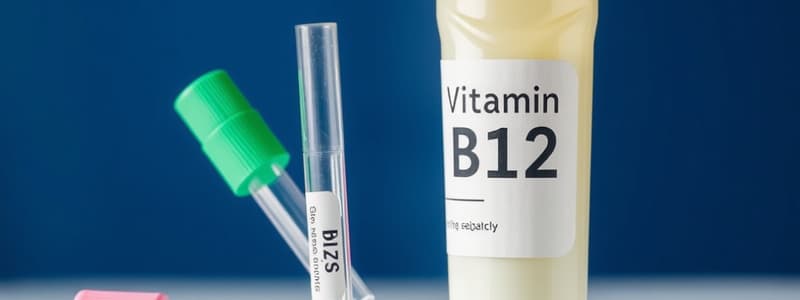Podcast
Questions and Answers
Which laboratory abnormality is commonly associated with B12 deficiency?
Which laboratory abnormality is commonly associated with B12 deficiency?
What does Total Iron Binding Capacity (TIBC) primarily measure?
What does Total Iron Binding Capacity (TIBC) primarily measure?
Which condition could represent a severe deficiency in all blood cell types?
Which condition could represent a severe deficiency in all blood cell types?
Which of these findings would NOT be typical in iron deficiency anemia?
Which of these findings would NOT be typical in iron deficiency anemia?
Signup and view all the answers
Which of the following is a characteristic of serum ferritin levels?
Which of the following is a characteristic of serum ferritin levels?
Signup and view all the answers
Study Notes
Iron Metabolism and Testing
- Serum Ferritin: Indicates iron storage levels in the body.
- Total Iron Binding Capacity (TIBC): Measures transferrin; important for binding iron in the bloodstream.
- Serum Iron: Reflects the amount of circulating iron available in the blood.
B12 Deficiency Laboratory Abnormalities
- Macrocytic Anemia: Characterized by the presence of larger-than-normal red blood cells.
- Normocytic Anemia: May be observed with increased red cell distribution width if iron deficiency exists.
- Reticulocyte Count: Typically low in cases of B12 deficiency, indicating inadequate red blood cell production.
- Leukopenia and/or Thrombocytopenia: Mild reductions in white blood cells and platelets may occur.
- Hypersegmented Neutrophils: Identification on blood smears serves as a key indicator of B12 deficiency.
- Serum Vitamin B12 Level: Often found to be low in patients with deficiency.
- Elevated Serum Homocysteine and Methylmalonic Acid: These metabolites increase when B12 is deficient.
- Anti-Intrinsic Factor Antibodies: Can indicate autoimmune pernicious anemia; a potential cause of B12 deficiency.
- Pancytopenia: Represents a decrease in all blood cell types, which may be associated with severe B12 deficiency.
Hematological Findings
- Salmon Patch: A type of skin finding associated with various conditions.
- Black Sunbursts and Iridescent Spots of Hemosiderin: Reflect iron deposits in tissues.
- Silver Wiring: Observed in the context of retinal findings associated with various diseases.
Studying That Suits You
Use AI to generate personalized quizzes and flashcards to suit your learning preferences.
Related Documents
Description
This quiz covers key laboratory tests and possible abnormalities related to iron storage and vitamin B12 deficiency. It explores concepts such as Serum Ferritin, Total Iron Binding Capacity (TIBC), Serum Iron, and macrocytic anemia. Test your knowledge on the implications of these lab results in clinical practice.




